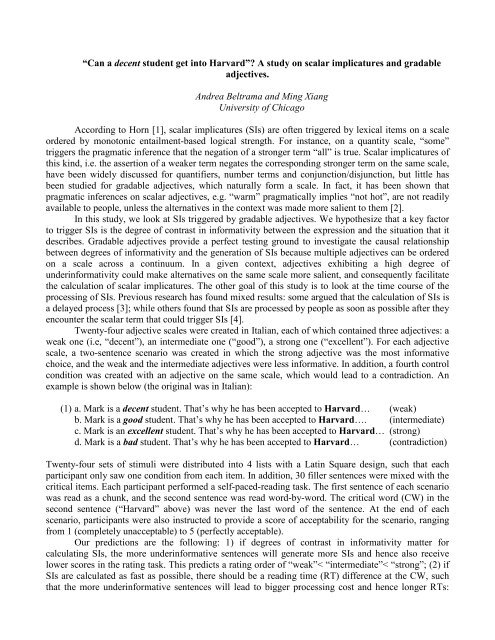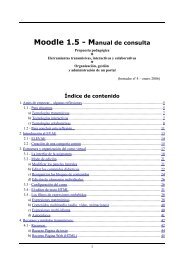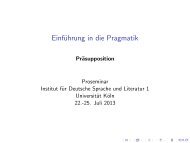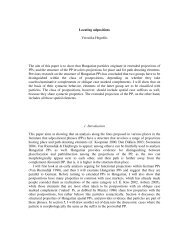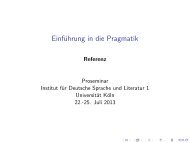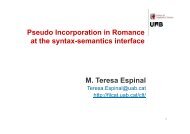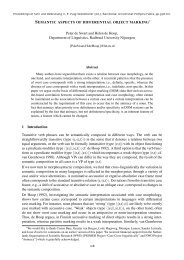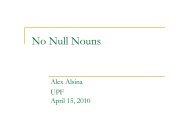A study on scalar implicatures and gradable adjectives. - corpora ...
A study on scalar implicatures and gradable adjectives. - corpora ...
A study on scalar implicatures and gradable adjectives. - corpora ...
You also want an ePaper? Increase the reach of your titles
YUMPU automatically turns print PDFs into web optimized ePapers that Google loves.
“Can a decent student get into Harvard” A <str<strong>on</strong>g>study</str<strong>on</strong>g> <strong>on</strong> <strong>scalar</strong> <strong>implicatures</strong> <strong>and</strong> <strong>gradable</strong><br />
<strong>adjectives</strong>.<br />
Andrea Beltrama <strong>and</strong> Ming Xiang<br />
University of Chicago<br />
According to Horn [1], <strong>scalar</strong> <strong>implicatures</strong> (SIs) are often triggered by lexical items <strong>on</strong> a scale<br />
ordered by m<strong>on</strong>ot<strong>on</strong>ic entailment-based logical strength. For instance, <strong>on</strong> a quantity scale, “some”<br />
triggers the pragmatic inference that the negati<strong>on</strong> of a str<strong>on</strong>ger term “all” is true. Scalar <strong>implicatures</strong> of<br />
this kind, i.e. the asserti<strong>on</strong> of a weaker term negates the corresp<strong>on</strong>ding str<strong>on</strong>ger term <strong>on</strong> the same scale,<br />
have been widely discussed for quantifiers, number terms <strong>and</strong> c<strong>on</strong>juncti<strong>on</strong>/disjuncti<strong>on</strong>, but little has<br />
been studied for <strong>gradable</strong> <strong>adjectives</strong>, which naturally form a scale. In fact, it has been shown that<br />
pragmatic inferences <strong>on</strong> <strong>scalar</strong> <strong>adjectives</strong>, e.g. “warm” pragmatically implies “not hot”, are not readily<br />
available to people, unless the alternatives in the c<strong>on</strong>text was made more salient to them [2].<br />
In this <str<strong>on</strong>g>study</str<strong>on</strong>g>, we look at SIs triggered by <strong>gradable</strong> <strong>adjectives</strong>. We hypothesize that a key factor<br />
to trigger SIs is the degree of c<strong>on</strong>trast in informativity between the expressi<strong>on</strong> <strong>and</strong> the situati<strong>on</strong> that it<br />
describes. Gradable <strong>adjectives</strong> provide a perfect testing ground to investigate the causal relati<strong>on</strong>ship<br />
between degrees of informativity <strong>and</strong> the generati<strong>on</strong> of SIs because multiple <strong>adjectives</strong> can be ordered<br />
<strong>on</strong> a scale across a c<strong>on</strong>tinuum. In a given c<strong>on</strong>text, <strong>adjectives</strong> exhibiting a high degree of<br />
underinformativity could make alternatives <strong>on</strong> the same scale more salient, <strong>and</strong> c<strong>on</strong>sequently facilitate<br />
the calculati<strong>on</strong> of <strong>scalar</strong> <strong>implicatures</strong>. The other goal of this <str<strong>on</strong>g>study</str<strong>on</strong>g> is to look at the time course of the<br />
processing of SIs. Previous research has found mixed results: some argued that the calculati<strong>on</strong> of SIs is<br />
a delayed process [3]; while others found that SIs are processed by people as so<strong>on</strong> as possible after they<br />
encounter the <strong>scalar</strong> term that could trigger SIs [4].<br />
Twenty-four adjective scales were created in Italian, each of which c<strong>on</strong>tained three <strong>adjectives</strong>: a<br />
weak <strong>on</strong>e (i.e, “decent”), an intermediate <strong>on</strong>e (“good”), a str<strong>on</strong>g <strong>on</strong>e (“excellent”). For each adjective<br />
scale, a two-sentence scenario was created in which the str<strong>on</strong>g adjective was the most informative<br />
choice, <strong>and</strong> the weak <strong>and</strong> the intermediate <strong>adjectives</strong> were less informative. In additi<strong>on</strong>, a fourth c<strong>on</strong>trol<br />
c<strong>on</strong>diti<strong>on</strong> was created with an adjective <strong>on</strong> the same scale, which would lead to a c<strong>on</strong>tradicti<strong>on</strong>. An<br />
example is shown below (the original was in Italian):<br />
(1) a. Mark is a decent student. That’s why he has been accepted to Harvard… (weak)<br />
b. Mark is a good student. That’s why he has been accepted to Harvard…. (intermediate)<br />
c. Mark is an excellent student. That’s why he has been accepted to Harvard… (str<strong>on</strong>g)<br />
d. Mark is a bad student. That’s why he has been accepted to Harvard… (c<strong>on</strong>tradicti<strong>on</strong>)<br />
Twenty-four sets of stimuli were distributed into 4 lists with a Latin Square design, such that each<br />
participant <strong>on</strong>ly saw <strong>on</strong>e c<strong>on</strong>diti<strong>on</strong> from each item. In additi<strong>on</strong>, 30 filler sentences were mixed with the<br />
critical items. Each participant performed a self-paced-reading task. The first sentence of each scenario<br />
was read as a chunk, <strong>and</strong> the sec<strong>on</strong>d sentence was read word-by-word. The critical word (CW) in the<br />
sec<strong>on</strong>d sentence (“Harvard” above) was never the last word of the sentence. At the end of each<br />
scenario, participants were also instructed to provide a score of acceptability for the scenario, ranging<br />
from 1 (completely unacceptable) to 5 (perfectly acceptable).<br />
Our predicti<strong>on</strong>s are the following: 1) if degrees of c<strong>on</strong>trast in informativity matter for<br />
calculating SIs, the more underinformative sentences will generate more SIs <strong>and</strong> hence also receive<br />
lower scores in the rating task. This predicts a rating order of “weak”< “intermediate”< “str<strong>on</strong>g”; (2) if<br />
SIs are calculated as fast as possible, there should be a reading time (RT) difference at the CW, such<br />
that the more underinformative sentences will lead to bigger processing cost <strong>and</strong> hence l<strong>on</strong>ger RTs:
“weak” > “intermediate” > “str<strong>on</strong>g”. For both of these predicti<strong>on</strong>s, the c<strong>on</strong>tradicti<strong>on</strong> c<strong>on</strong>diti<strong>on</strong> serves as<br />
a c<strong>on</strong>trol baseline.<br />
The Preliminary results from 16 native speakers of Italian are shown in Table 1. Regarding the<br />
acceptability judgment, sentences c<strong>on</strong>taining weak <strong>adjectives</strong> are rated significantly lower than those<br />
with intermediate <strong>and</strong> str<strong>on</strong>g <strong>adjectives</strong> (all ps.5). This suggests that SI calculati<strong>on</strong>s were not immediately<br />
available to people when they first encounter the SI triggers. This supports the view that SI processing,<br />
being pragmatic in nature, is a delayed process.<br />
Table 1 Acceptability judgment resp<strong>on</strong>se <strong>and</strong> RT results (n=16)<br />
C<strong>on</strong>diti<strong>on</strong><br />
Weak Intermediate Str<strong>on</strong>g C<strong>on</strong>tradictory<br />
Resp<strong>on</strong>se (1-5) 3.15 4.13 4.24 1.50<br />
Resp<strong>on</strong>se time 3602.0 3766.4 3296.4 2572.8<br />
(ms)<br />
RT at the CW<br />
(ms)<br />
649.4 659.4 669.2 739.9<br />
Reference<br />
[1] Horn, Laurence. 1984. "A new tax<strong>on</strong>omy for pragmatic inference: Q-based <strong>and</strong> R-based<br />
implicature." In D. Schiffrin (ed.), Meaning, Form <strong>and</strong> Use in C<strong>on</strong>text (GURT '84), 11-42.<br />
[2] Doran, Ryan, Rachel Baker, Yar<strong>on</strong> McNabb, Meredith Lars<strong>on</strong>, <strong>and</strong> Gregory Ward, 2008,“On the<br />
N<strong>on</strong>-Unified Nature of Scalar Implicature: An Empirical Investigati<strong>on</strong>,” in Internati<strong>on</strong>al Review of<br />
Pragmatics 1:1-38.<br />
[3] Bott, L. & Noveck, I.A. (2004). Some utterances are underinformative: The <strong>on</strong>set <strong>and</strong> time course<br />
of <strong>scalar</strong> inferences. Journal of Memory <strong>and</strong> Language, 51(3), 437-457.<br />
[4] Nieuwl<strong>and</strong>, M.; Ditman, T. & Kuperberg, G. 2010. On the incrementality of pragmatic processing:<br />
An ERP investigati<strong>on</strong> of informativeness <strong>and</strong> pragmatic abilities. Journal of Memory <strong>and</strong> Language.<br />
63:324-346.


